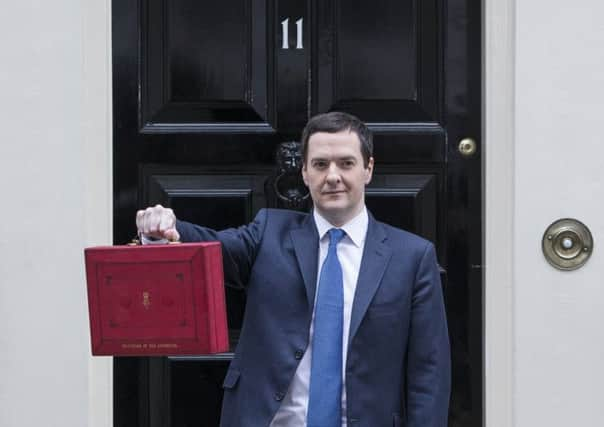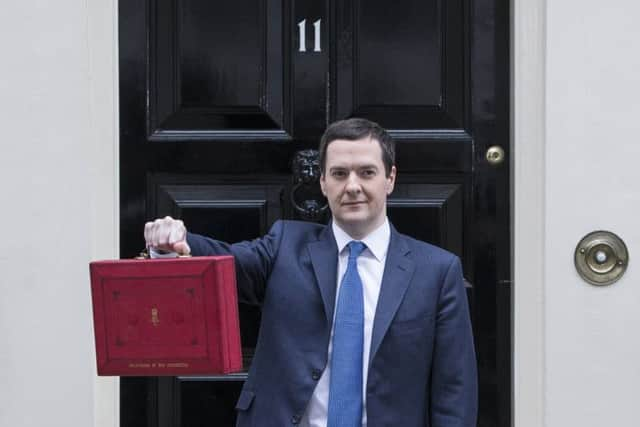Comment: Budget could determine election outcome


George Osborne will be walking a fiscal tightrope without the aid of a safety net when he delivers Wednesday’s Budget. If he gets it right it could be the decisive factor in convincing UK voters to back his party at May’s General Election (even if the impact in Scotland, where the Tories have just a single seat, is likely to be far less significant). If he fails to convince the wider electorate then he may soon find himself sitting in the Opposition benches.
The Chancellor will certainly need to pull off a tough balancing act. While the Treasury could find itself with a potential surplus of £30 billion by the end of the next parliament, a result of lower inflation reducing the costs of public spending, he has been committed to austerity throughout the five years of government. Abandoning this approach in favour of tax giveaways just before a general election would surely question his political credibility.
Advertisement
Hide AdAdvertisement
Hide AdWhile it’s difficult to know exactly how Mr Osborne will divide the cake, and even more so two months before one of the most unpredictable UK elections ever, there have been a number of measures trailed in the media.


We can expect new powers to be proposed for HMRC to recover taxes and clamp down further on aggressive tax avoidance, especially following the furore over HSBC.
Details of a so-called “Google Tax” are also expected to be announced, aimed at cracking down on multi- national companies that are deemed to be avoiding tax by transferring income overseas. Given that any additional revenue resulting from this move could be used to support an increase in personal allowances up to £11,000, it could prove to be a vote winner. There are, of course, significant questions over the enforceability of such rules, their impact on jobs and investment and whether they would open the door to legal challenges.
The Chancellor is also expected to set out his plans on how he would require multinational companies to disclose revenues and profits on a country-by-country basis. With the general election looming there is always potential for another populist measure such as a banks bonus or profits tax.
Mr Osborne is unlikely to miss the opportunity to talk up the recent successes of the UK economy compared with the eurozone and other parts of the globe. To support further growth he may look at areas such as a possible extension to the annual investment allowance for another year at the £500,000 rate (it is currently due to fall to £25,000 at the end of this year) to encourage more spending amongst businesses. A return of industrial buildings allowance or extension to enhanced capital allowances could also be on the cards to support infrastructure projects.
Research and development relief could be extended to cover investment into building prototypes. We may also see some new National Insurance incentives for small businesses to help encourage further employment.
I would certainly expect to hear about several measures to help the UK’s struggling oil and gas sector. A further cut in the ring-fence corporation tax (RFCT) is a possibility. The government already announced it would consider further reductions when it was lowered from 32 to 30 per cent in December. We may also see changes to improve access to decommissioning relief to help smaller specialist oil and gas companies who are not liable for RFCT.
We will also be awaiting more details on the basin-wide investment allowance, which will be the replacement of existing offshore field allowances, and how it might act as a stimulus for more exploration. Another sector that may get support is mining which has also seen its commodity price fall dramatically. There’s also potential for a further cut in Scotch whisky excise duty, a move that would be much welcomed this side of the Border.
Advertisement
Hide AdAdvertisement
Hide AdLike all chancellors before him in a pre-election Budget, George Osborne will need to walk a tightrope on Wednesday. A few vote-enticing measures thrown in at the expense of multinational companies and wealthy individuals may help him justify his often repeated mantra of “we’re all in this together” but on 7 May the UK voters will give their verdict on whether they believe it.
• Susie Walker is a partner and head of tax at accountancy and business advisory firm Johnston Carmichael
SUBSCRIBE TO THE SCOTSMAN’S BUSINESS BRIEFING